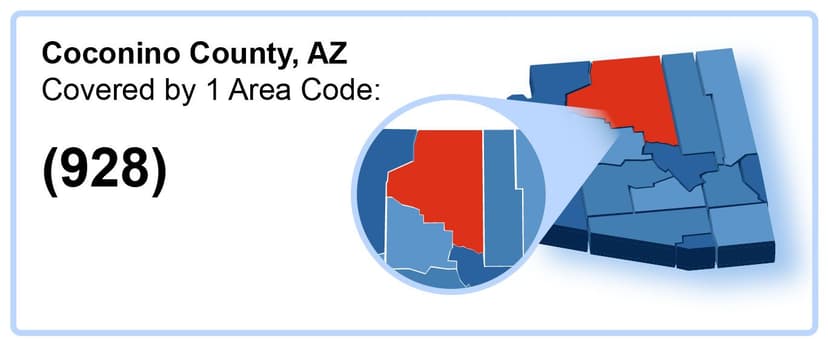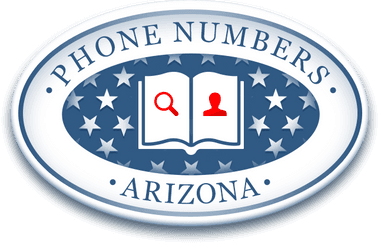What are Coconino County Area Codes?

An area code is a three-digit number that precedes a North American phone number. The North American Numbering Plan (NANP) uses the Coconino County area code to specify the Numbering Plan Area (NPA) for locally-registered phone numbers. The Arizona Corporation Commission regulates telecommunications and administers area codes in the state.
The 928 NPA is currently the only active area code in Coconino County.
Area Code 928
Area code 928 was created in 2001 from a split of the 520 NPA and is the NANP area code that initially covered all of Arizona except Phoenix and Tucson. It presently encompasses all of Coconino County along with other north-central counties in the state. Notable Coconino cities and communities within this area code include Flagstaff, Tuba City, Cameron, Page, Williams, and Grand Canyon. Others are Fredonia, Tonalea, Tusayan, Red Lake, and Kachina.
What are the Best Cell Phone Plans in Coconino County?
Coconino County enjoys phone services from all four major phone carriers in the U.S, although network performance generally suffers in Arizona’s rural areas. Verizon has the best network reach with 82% coverage, while AT&T comes second at 59.4%. T-Mobile has a network spread of 58.9%, and Sprint ranks last with 26.2% coverage of the county. However, various Mobile Virtual Network Operators (MVNOs) bridge these service gaps by relying on the major carriers’ networks to provide affordable communications services.
In 2018, statistics from a CDC survey revealed that Coconino County residents are massively migrating from landline telephony services to wireless services. The proportion of adult Arizonans who resided in landline-only households was 3.3%. In contrast, those who relied exclusively on wireless-only services made up 64.9% of the adult population. Among under-18 Arizonans, only 1.2% still maintained landline phone subscriptions compared to 75.7% who had adopted cell phones as their sole telecommunication devices.
In 2017, the Coconino County Board of Supervisors approved the provisioning of Voice over Internet Protocol (VoIP) telephony infrastructure for most of its local agencies. This migration from traditional phone services to digital telecommunications is also becoming widespread among county residents. VoIP telephony services offer a robust range of flexible features and guarantee affordable call rates, especially for long-distance communications.
What are Coconino County Phone Scams?
Coconino County phone scams are cons that fraudsters commit against residents using telecommunications services. Popular telephony services employed include live calls, automated phone calls, and text messages. Phone scammers have only one goal - deprive county residents of their funds and steal personal information to commit identity theft. They usually impersonate legitimate public agencies and businesses that residents trust to increase their chances of success. Coconino County residents can uncover the identities of phone scammers using reverse phone lookup tools. Phone scam incidents within the county can be reported to the Coconino County Sheriff’s Office (CCSO) or the Arizona Attorney General’s Office (AGO).
Commonly reported scams in Coconino County include:
What are Coconino County Law Enforcement Impersonation Scams?
Scammers pose as members of local law enforcement in this scam and call Coconino County residents to accuse them of various infractions. They often mention the names of actual local law enforcement agents to convince their marks that they are genuine and gain their trust. Typical charges leveled against residents include missed jury duty, unpaid traffic tickets, and uncleared warrants. These scammers then instruct their targets to either make payments using prepaid cards or wire transfers or face immediate arrests. Coconino County residents can perform reverse phone number lookups to retrieve identifying information on these callers and avoid scams. The CCSO warns residents never to pay money to or share confidential information with unfamiliar persons over the phone. They remind residents that CCSO deputies neither request nor accept payments in unsolicited phone calls. Besides using phone lookup tools, residents can also call the CCSO to confirm these callers’ claims and identities.
What are Coconino County Arizona Public Service Utility Scams?
The Arizona Public Service (APS) warns its customers to hang up on any caller threatening to disconnect service if they fail to make payments promptly. APS is the primary utility service provider in the state and serves an estimated 2.7 million consumers with clean and affordable energy. Scammers often impersonate APS employees in an attempt to deceive Coconino County residents into sending money to settle nonexistent utility bills or sharing confidential account information. These scammers tend to be most active during holiday seasons and often prefer odd payment methods such as gift cards and money orders. Coconino County residents who receive such calls can run the callers’ phone numbers through free reverse phone lookup search engines to find out if they are actual APS employees. These search engines can also recover valuable information on who called. Targeted residents can also confirm the identities of such callers by contacting the APS Customer Care Center at (602) 371-7171.
What are Coconino County Social Security Administration Scams?
In these scams, fraudsters call Coconino County residents and claim to be with the Social Security Administration (SSA) in an attempt to obtain confidential information for identity and financial theft. Several variants of these scams exist, but a common tactic involves a fraudster informing an unsuspecting resident that their social security number has been suspended because of alleged criminal activities. They get their mark to confirm their social security number and ask them to pay a fee to reactivate it or issue a new social security number.
In another iteration of these scams, an unsuspecting resident receives a call from a purported SSA representative with news such as an increase in social security benefits. The individual must, however, provide information such as their name, birth date, and social security number to access the said benefits. Note that the SSA never makes unsolicited calls and will only call if the individual first initiated contact. They will also never ask for social security numbers for any reason. Coconino County residents who receive such suspicious calls should file reports by calling the Social Security Fraud’s hotline at 1 (800) 269-0271. They can also confirm the identities of such callers by contacting the Social Security’s Customer Service line at 1 (800) 772-1213. Alternatively, residents can answer the question: “who is this number registered to?” using free phone number lookup services.
What are Robocalls and Spam Calls?
A robocall is an automated phone call that uses an autodialer to deliver a recorded message to mass recipients within a short time. Robocalls provide a cheaper alternative for many legitimate businesses to advertise their products and services to potential customers. They also serve as an effective means of passing time-sensitive information, leading to their widespread use in electoral campaigns and other informational services. Most telemarketers, charities, and debt collection firms also use robocall technology to disseminate information quickly. Generally, a robocall is a type of spam call because it is unwanted and unsolicited.
Robocall adoption in several scam schemes has also become prevalent in recent times. Scammers find robocalls convenient and affordable. They sometimes use spoofed robocalls and impersonate local legitimate businesses and public institutions to extort Coconino County residents. Reverse phone search services are very helpful in identifying incoming robocalls and avoiding scams.
You can take the following actions in response to inbound robocalls to avoid scams:
- Refrain from answering calls from unknown phone numbers.
- Hang up on a call once you hear a recorded voice. Do not attempt to speak with a live operator or follow any prompt. Scammers may harass you with more robocalls in the future if you do.
- Sign up on the National Do Not Call Registry to stop receiving robocalls from legitimate telemarketers. You can join this list by registering online or calling 1 (888) 382-1222 with the phone number you intend to enroll. Robocalls that make their way through your phone after 31 days of registration are potential scam calls.
- Activate the call-blocking feature offered by your phone manufacturer to screen and block robocall or spam numbers. You can also download free third-party call-blocking applications on mobile stores and use them.
- Report any incident of unwanted robocalls online to the FTC or FCC. You can also file a consumer complaint with the Arizona AGO online.
How Can You Spot and Report Coconino County Phone Scams?
Phone scammers are versatile and they relentlessly attempt to dupe Coconino County residents. They leverage recent advances in telephony technology to repackage old scam schemes and rip unsuspecting residents off. Residents can protect themselves against phone scams by learning how phone scammers operate and also watching out for scam red flags.
Some red flags that warn of potential phone scams are:
- Scammers often use intimidation and pressure tactics to coerce their marks to make hasty decisions and accede to their demands. They also use threats of fines, detentions, license suspensions/revocations, and litigations to obtain targets’ compliance.
- Unfamiliar callers that claim to be representatives of reputable entities and demand immediate payments are likely scammers. Legitimate entities rarely make such demands over the phone. Reverse phone lookup apps can offer insights into suspicious callers’ identities and expose scams.
- Callers that advertise products and services with terms that sound too exciting usually indicate potential scams. Scammers often offer their targets cheap travel, free product trials, cash prizes, and investments that promise high yields at little/no risks.
- Fraudsters always aim to steal their targets’ money either by requesting financial information over the phone. Information often requested by scammers include PINs, account passwords, credit card details, and social security numbers.
- Phone scammers regularly request cryptocurrencies, wire transfers, preloaded cards, and gift cards, and other irregular payment methods as preferred payment channels. These payment channels offer scammers foolproof ways of robbing their marks and evading law enforcement.
- Unexpected phone calls by unknown computer technicians asking for remote access to carry out computer repairs are signs of a phone scam. Computer repairs should only be done by verified technicians contacted through phone numbers listed on tech companies’ official websites.
Regular scam awareness and vigilance, however, remain the best way to avoid phone scams in Coconino County. Some government agencies and institutions are continually involved in ensuring residents’ safety against phone scams. They include:
Coconino County Sheriff’s Office: The Sheriff’s Office protects county residents from criminal activities, including phone scams. They also provide fraud awareness and regularly notify residents of prevalent phone scams in the county to protect them from becoming scam victims. Coconino County residents can report instances of phone scams to the Sheriff’s Office by calling (928) 774-4523.
Federal Trade Commission: The FTC ensures fair and honest commercial practices in the U.S. marketplace. They restrict telemarketers and other sales-based entities from calling residents registered on the National Do Not Call List. The FTC also provides information on how to block unwanted calls on any platform on its website. Coconino County residents can submit complaints of phone scams and unwanted robocalls to the FTC online or call the Commission on 1 (888) 382-1222.
Federal Communications Commission: This is the principal federal agency that oversees U.S. foreign and domestic communications. They also ensure consumers are protected from unlawful robocalls, phone spoofing scams, and identity theft. Coconino County residents who have suffered robocalls and phone spoofing scams-related losses can call 1 (888) 225-5322 to file reports with the FCC or report online.
Arizona Office of the Attorney General: This office protects Arizonans from misleading and unfair business practices. They also shield residents from consumer frauds and phone scams by arming them with necessary information on how to avoid phone scams. Arizonans who believe they have been targets of phone scams and fraudulent commercial practices can file complaints with the Arizona OAG online. They can also call (602) 542-5763 (Phoenix), (520) 628-6648 (Tucson), or (800) 352-8431 toll-free for residents outside of metro Phoenix to lodge complaints.
